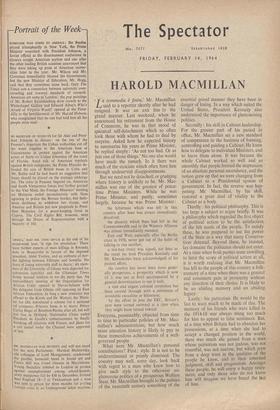—Portrait of the Week— EVERYONE WAS GOING TO AMERICA: the
Beatles played triumphantly in New York, the Prime Minister consulted with President Johnson, a Soviet official at the disarmament conference in Geneva sought American asylum and one after the other leading British scientists announced that they were taking up posts at American univer- sities later in the year. Mr. Wilson and Mr. Crossrnan immediately blamed the Government, but the new Minister of Education, Mr. Hogg, said that they sometimes came back. Only The Times saw a connection between university over- crowding and lowered standards of research. American art came to London: the pop paintings of Mr. Robert Rauschenberg drew crowds to the Whitechapel Gallery and Edward Albee's Who's Afraid of Virginia Woolf? opened at the Picca- dilly to the bewilderment of Mr. Harold Hobson, who complained that no one had told him all the people were mad.
NO SHORTAGE OF SUBJECTS for Sir Alec and Presi- dent Johnson to discuss: on the eve of the Premier's departure the Cuban authorities cut off the water supplies to the American base at Guantanamo in protest against the American arrest of thirty-six Cuban fishermen off the coast of Florida. Amid talk of American reprisals against British companies, the Prime Minister de- fended the sale of British buses to Cuba and Mr. Butler said he had heard no suggestion that buses should be placed on the strategic embargo list. The crisis in Panama lingered on, American and South Vietnamese forces last further ground to the Viet Minh, the Foreign Ministers' meeting on Malaysia ended inconclusively with Siam agreeing to police the Borneo' border, but Indo- nesia declining to withdraw her troops, and America and Britain put new proposals to Presi- dent Makarios for a peace-keeping force in Cyprus. The Civil Rights Bill, however, went through the House of Representatives with a majority of 160.
*
'AFRICA,' SAID MR. CHOU EN-LAI at the end of his seven-week tour, 'is ripe for revolution.' There were further reports of mass killings in Rwanda, riots in Brazzaville in favour of the deposed president, Abbe Youlou, and an outburst of bor- der fighting between Ethiopia and Somalia. No fears of losing university staff in Accra: six mem- bers of the University of Ghana were deported for subversive activities and the Ghanaian Times firmly warned students to toe the party line. An extraordinary meeting of the Organisation for African Unity opened in Dar-es-Salaam with the delegates from Ghana still opposing an East African Federation. In Iraq a new armistice was offered to the Kurds anti Dr. Wattari, the Minis- ter for Oil, introduced a scheme for a national oil company. Princess Irene is to marry Prince Carlos Hugo of Bourbon-Parma after all, but will not live in Holland, Nationalist China ended President de Gaulle's embarrassment by finally breaking off relations with France, and plans for a rail tunnel under the Channel were approved at last.
*
MR. MACMILLAN WAS SEVENTY and will not stand for the next Parliament: Marshal Malinovsky, old colleague of Lord Montgomery, condemned the pacifist, humanist trend in Soviet art and Fanny Hill was found obscene in Marylebone. Young Socialists lobbied in London in protest against unemployment among school-leavers, army manpower fell by 450 in December, Ireland beat England 18-5 at Twickenham and a man Was sent to prison for three months for putting' foreign coins in an Underground ticket machine.


































 Previous page
Previous page